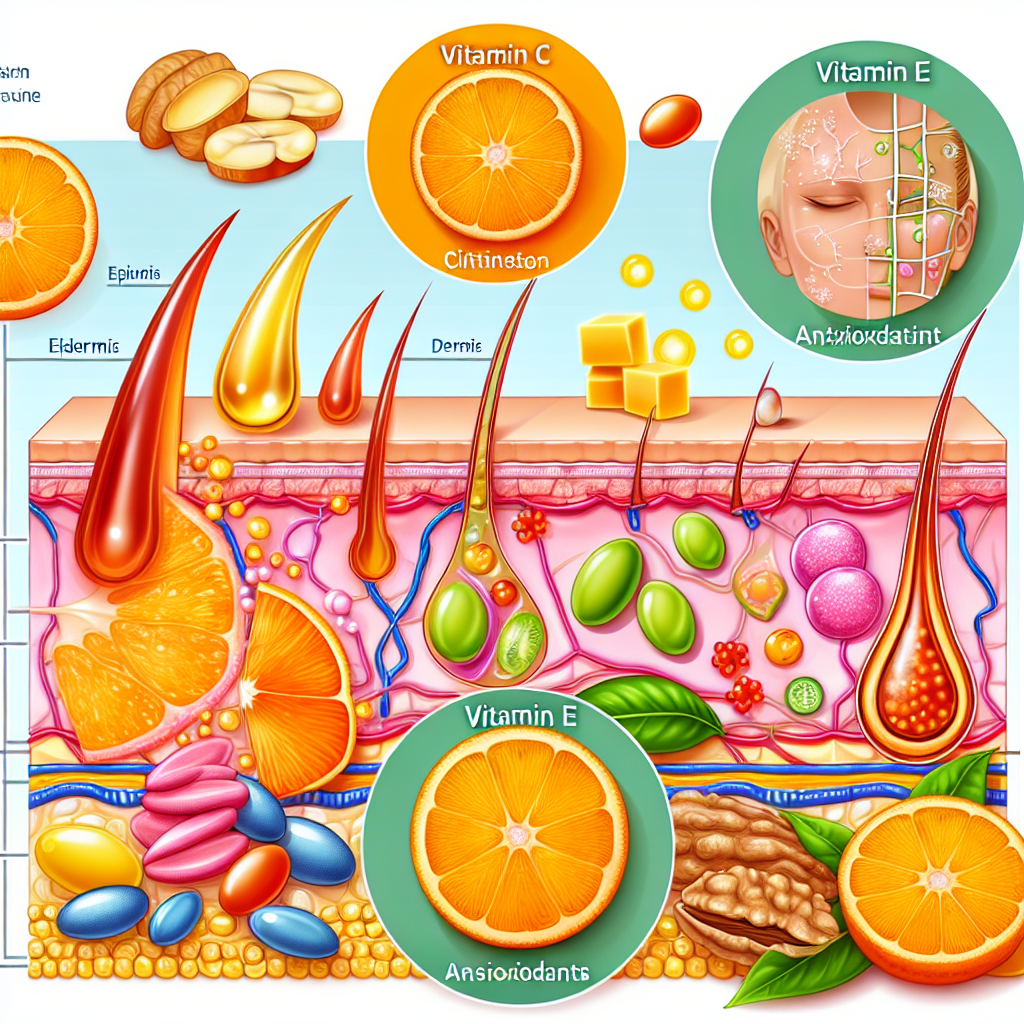How Vitamin C and E Keep Your Skin Glowing

Discover how Vitamins C and E can keep your skin glowing! Learn more about their benefits and how to incorporate them into your skincare routine. Don’t wait, start your journey to healthier, radiant skin today. Click here to find out more.
The Role of Vitamin C and E in Achieving Radiant Skin
The quest for radiant, glowing skin is a journey that many embark on, but few truly understand the science behind achieving this coveted look. The secret to maintaining a youthful, vibrant complexion lies not only in the products we apply topically but also in the nutrients we consume. Among these, vitamins C and E play a pivotal role in skin health, contributing significantly to its radiance and glow.
Vitamin C, also known as ascorbic acid, is a potent antioxidant that is essential for the health of your skin. It plays a crucial role in collagen synthesis, a process that helps maintain the skin’s elasticity and firmness. Collagen is a protein that gives the skin its structure, and as we age, its production naturally decreases, leading to wrinkles and sagging skin. By boosting collagen production, vitamin C helps to counteract these signs of aging, promoting a smoother, more youthful complexion.
Moreover, vitamin C is renowned for its ability to brighten the skin. It inhibits the enzyme tyrosinase, which is responsible for converting tyrosine into melanin, the pigment that gives skin its color. By doing so, vitamin C helps to fade dark spots and hyperpigmentation, resulting in a more even skin tone. Additionally, it has anti-inflammatory properties that can help reduce redness and inflammation, further contributing to a clearer, more radiant complexion.
On the other hand, vitamin E is another powerful antioxidant that works synergistically with vitamin C to protect the skin from damage. It is fat-soluble, meaning it can penetrate deep into the skin’s layers to neutralize harmful free radicals. These are unstable molecules that can damage the skin’s cells, leading to premature aging and dullness. By neutralizing these free radicals, vitamin E helps to prevent this damage, preserving the skin’s youthful glow.
Furthermore, vitamin E has moisturizing properties that help to keep the skin hydrated. It strengthens the skin’s barrier function, preventing moisture loss and keeping the skin plump and supple. This is particularly beneficial for those with dry skin, as it can help to alleviate dryness and flakiness, promoting a smoother, healthier complexion.
In addition to its moisturizing benefits, vitamin E also has anti-inflammatory properties that can help to soothe irritated skin. It can help to calm inflammation and reduce redness, promoting a clearer, more even complexion. This makes it particularly beneficial for those with sensitive or acne-prone skin, as it can help to soothe breakouts and reduce the appearance of acne scars.
In conclusion, vitamins C and E are essential for maintaining radiant, glowing skin. They work together to protect the skin from damage, promote collagen production, and keep the skin hydrated and supple. By incorporating these vitamins into your skincare routine and diet, you can help to ensure that your skin remains healthy and vibrant. So, the next time you’re on the hunt for a new skincare product, be sure to check the ingredients list for these skin-loving vitamins. Your complexion will thank you.
Unlocking the Secrets of Glowing Skin: The Power of Vitamins C and E

Unlocking the secrets of glowing skin is a quest that many embark on, but few truly master. The key, as it turns out, lies not in expensive creams or invasive procedures, but in the humble realm of vitamins. Specifically, vitamins C and E have been found to possess remarkable skin-enhancing properties that can help you achieve that coveted glow.
Vitamin C, also known as ascorbic acid, is a potent antioxidant that plays a crucial role in maintaining skin health. It is essential for the synthesis of collagen, a protein that provides structure and elasticity to the skin. As we age, our skin’s natural collagen production decreases, leading to the formation of wrinkles and fine lines. By boosting collagen production, vitamin C helps to maintain skin’s youthful appearance and firmness.
Moreover, vitamin C has been shown to mitigate the damage caused by harmful ultraviolet (UV) radiation. Exposure to UV light generates free radicals, unstable molecules that can damage the skin cells. Vitamin C neutralizes these free radicals, thereby reducing the risk of premature skin aging and skin cancer. It also inhibits the production of melanin, the pigment responsible for skin discoloration and dark spots, resulting in a brighter and more even skin tone.
On the other hand, vitamin E, also known as tocopherol, is another powerful antioxidant that works in synergy with vitamin C to protect the skin. It is particularly effective in defending the skin against damage from the sun. Vitamin E absorbs the harmful UV light when applied topically, preventing direct damage to the skin cells. This photoprotective quality reduces the depth of wrinkles and the roughness of skin, contributing to a smoother and healthier complexion.
Vitamin E also has an anti-inflammatory effect on the skin. It helps to soothe and calm inflamed skin, making it beneficial for conditions like acne and eczema. Furthermore, vitamin E aids in skin repair and regeneration. It accelerates the healing of damaged skin and reduces the appearance of scars, leading to a more flawless complexion.
The combination of vitamins C and E provides a comprehensive approach to skin care. While both vitamins individually offer significant benefits, they work even better together. Vitamin C regenerates vitamin E, enhancing its antioxidant power, while vitamin E stabilizes vitamin C and extends its effectiveness. This dynamic duo not only protects the skin from environmental damage but also improves skin texture and tone, promoting a radiant and youthful glow.
Incorporating these vitamins into your skincare routine can be as simple as choosing products that contain them. Look for serums, creams, and lotions that list vitamins C and E among their ingredients. Alternatively, you can also boost your intake of these vitamins through your diet. Foods rich in vitamin C include citrus fruits, strawberries, and bell peppers, while vitamin E can be found in nuts, seeds, and leafy green vegetables.
In conclusion, the secret to glowing skin may be as straightforward as nourishing it with the right vitamins. Vitamins C and E, with their potent antioxidant and skin-enhancing properties, offer a natural and effective way to maintain a radiant complexion. So, the next time you find yourself yearning for that elusive glow, remember to turn to these powerful vitamins.
How Vitamins C and E Contribute to a Healthy, Glowing Complexion
Vitamin C and E are two essential nutrients that play a significant role in maintaining a healthy, glowing complexion. These vitamins are potent antioxidants that protect the skin from harmful free radicals, which are unstable molecules that can damage the skin cells and contribute to premature aging.
Vitamin C, also known as ascorbic acid, is a water-soluble vitamin that is crucial for the synthesis of collagen, a protein that provides structure and elasticity to the skin. By promoting collagen production, vitamin C helps to keep the skin firm and reduce the appearance of fine lines and wrinkles. Moreover, vitamin C has a brightening effect on the skin. It inhibits the enzyme tyrosinase, which is responsible for the production of melanin, the pigment that gives skin its color. By doing so, vitamin C can help to fade dark spots and even out skin tone, resulting in a brighter, more radiant complexion.
On the other hand, vitamin E, also known as tocopherol, is a fat-soluble vitamin that is known for its moisturizing properties. It helps to strengthen the skin barrier, which is the outermost layer of the skin that protects it from environmental aggressors such as UV rays and pollution. A strong skin barrier is essential for maintaining a healthy, glowing complexion as it helps to keep the skin hydrated and prevent moisture loss. Furthermore, vitamin E has anti-inflammatory properties that can help to soothe and calm irritated skin, making it an excellent choice for those with sensitive or inflamed skin conditions.
When used together, vitamins C and E can provide even greater benefits for the skin. Studies have shown that these two vitamins work synergistically to enhance each other’s antioxidant effects. Vitamin C helps to regenerate vitamin E, allowing it to provide prolonged antioxidant protection. This combination of vitamins can provide a powerful defense against free radical damage, helping to prevent signs of aging and maintain a youthful, glowing complexion.
Incorporating vitamins C and E into your skincare routine can be done in several ways. Many skincare products, such as serums, moisturizers, and sunscreens, contain these vitamins. When choosing a product, it’s important to look for one that is formulated with a stable form of the vitamin to ensure its effectiveness. For example, L-ascorbic acid is a stable form of vitamin C that is commonly used in skincare products.
In addition to topical application, these vitamins can also be obtained through a balanced diet. Foods rich in vitamin C include citrus fruits, strawberries, bell peppers, and broccoli, while foods high in vitamin E include nuts, seeds, spinach, and avocados.
In conclusion, vitamins C and E are essential for maintaining a healthy, glowing complexion. They provide antioxidant protection, promote collagen production, strengthen the skin barrier, and have brightening and anti-inflammatory properties. By incorporating these vitamins into your skincare routine and diet, you can help to keep your skin looking youthful and radiant.